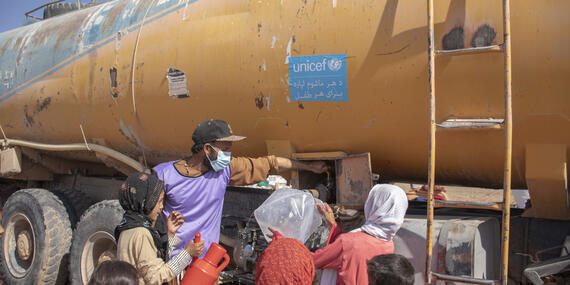Today's top news: Occupied Palestinian Territory, Afghanistan, South Sudan

Occupied Palestinian Territory
This morning, the Assistant Secretary-General for Humanitarian Affairs, Joyce Msuya briefed the UN on the humanitarian situation in Gaza. The briefing was organized by the Arab Group.
She said that that situation—which continues to unfold as we speak—can only be described as an utter catastrophe. As every hour passes, she said the restoration of essential supplies and services, and the need to get humanitarian assistance into Gaza becomes ever more critical.
Humanitarian supplies are on standby – we and our partners have stocks of food, water, medical supplies and fuel available in Egypt, Amman, the West Bank and Israel ready to be delivered now or within hours, Ms. Msuya said.
She noted that the UN will continue to engage with the parties and States with influence to identify urgent solutions to getting humanitarian access to Gaza so we can deliver these supplies; to secure humanitarian access throughout the territory; and to allow UN and NGO personnel in and out of the Strip. A humanitarian suspension of hostilities would provide the space for this to happen, for civilians to move safely, and some respite from the bloodshed.
For its part, the World Food Programme has more than 310 tons of ready-to-eat food either at the border or on their way to Rafah – enough to feed about a quarter-million people for more than a week.
More food supplies are arriving in Al Arish, in northeastern Egypt. On Sunday, a plane arrived carrying 5 tons of fortified biscuits. Another plane landed yesterday carrying an additional 15 tons, along with and mobile storage units for logistics capacity.
As we told you yesterday, the World Health Organization has more than 88 tons of health supplies at the ready. The UN Population Fund (UNFPA) is also pre-positioning sexual and reproductive health supplies in Egypt.
Meanwhile, the UN Refugee Agency (UNHCR) is supporting the overall UN effort to provide much-needed support to Gaza through the Egyptian Red Crescent. UNHCR will be providing bottled water, blankets, mattresses, jerrycans, hygiene kits and clothing items.
The people of Gaza cannot wait any longer – they need food, water, fuel and other essential supplies now.
Afghanistan
The Humanitarian Coordinator there, Daniel Endres, yesterday announced a nearly US$94 million Response Plan for Herat. This aims to swiftly save lives and support early recovery efforts over the next six months.
The earthquakes have struck vulnerable communities – already grappling with decades of conflict and under-development – and left them with little resilience to cope with multiple, simultaneous shocks. They come at the start of Afghanistan’s lean season and immediately before winter, when families’ food resources are most constrained or depleted.
The new plan targets 114,000 people, focusing on those whose homes were destroyed or severely damaged.
South Sudan
Six months since the start of the Sudan crisis, thousands of people continue to arrive daily in South Sudan. This influx is expected to continue.
As of 13 October, 310,000 people have crossed the border. The vast majority are people returning to South Sudan, but also includes refugees and third-country nationals.
The Humanitarian Coordinator in South Sudan, Marie-Helene Verney, warns that as the weeks go by, people arrive with fewer and fewer resources and are in increasingly worse states of health. Malnutrition is also on the rise among new arrivals as conditions in Sudan deteriorate further.
The International Organization for Migration and its partners have helped some 150,000 people to move on to final destinations so far. The Government of South Sudan has also provided transport to thousands, while many others have made their own way to their communities.
We need additional funding to provide life-saving nutrition services to thousands of children arriving from Sudan. There is also an urgent need to provide adequate space in overcrowded transit centres to reduce the risks of disease outbreaks and gender-based violence.
South Sudan continues to face overlapping crises, including floods, conflict and food insecurity. 9.4 million people – 76 percent the population – need humanitarian assistance. The $1.7 billion Humanitarian Response Plan for South Sudan is just over half funded.
